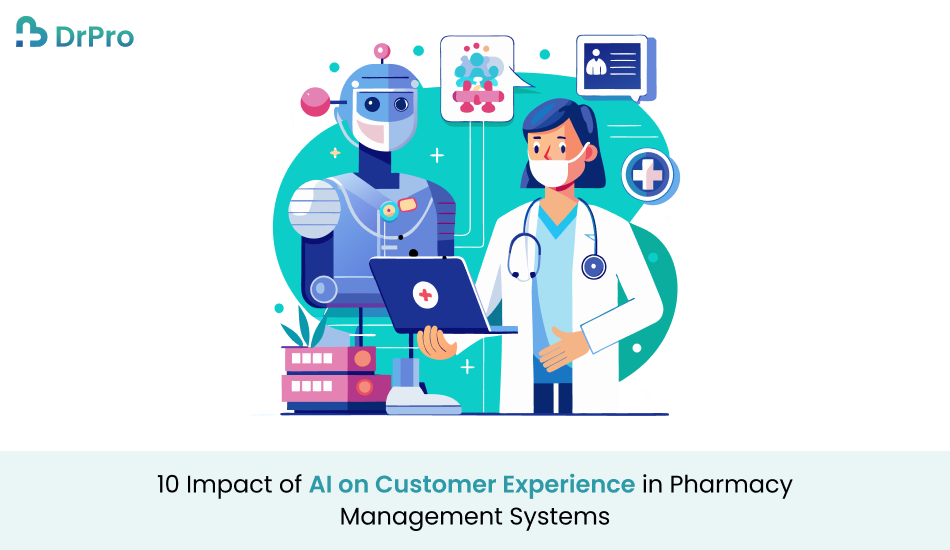Quick Summary
Using AI as an addition to extent management system of pharmacy is the new trend focused on the improvement of customers’ experience compared to an automated, accurate, and personal approach. Organized smart pharmacy systems employing artificial intelligence solve tasks automatically, decrease the role of a man, and provide individual services owing to customer information. These systems facilitate quicker prescription processing, anticipate the demand for medication, and enhance the placing of prescriptions through digital systems.
Introduction
Pharmacy management has not been left behind by the advancement of technology especially that which entails artificial intelligence (AI) in the recent past. Traditional pharmacy management systems were originally simple recording tools that have developed into complex tools that have multiple functionalities., Pharmacy management information systems are complex tools that are used to perform several functions, The Inclusion of artificial intelligence in these systems has greatly improved the quality of customer services by making them efficient, accurate and client based. When adopting these systems over the years the role of smart pharmacy system has been realized to be very vital as AI is enhanced and incorporated into the various systems.
Consequently, this article explores the role of AI on customers’ experience regarding pharmacy management systems but focuses on the significance of smart pharmacy systems in today’s developing healthcare.
1. Streamlining Operations in Smart Pharmacy Systems
Smart pharmacy systems which are based on artificial intelligence help decide and organize daily pharmacy processes, thus improving the services to the customers. Conventional pharmacy management solutions needed extensive human intervention in everything that ranged from prescription filing, stocking, and invoicing. Problematically, when these processes did work, they often resulted in delays, human mistakes, and ineffectiveness.
AI alters this since these procedures are automatic. For example, to check whether prescriptions meet legal and medical requirements, AI algorithms can do it in an instant. This makes it easy for pharmacists to deal with prescriptions, with enhanced speed and minimized cases of blunders. Furthermore, AI may be used in inventory control, in that the system will remind the pharmacists when stocks are running low or when products that require shelf clearance are a few weeks away from expiring. Such automation goes a long way in minimizing incidences of stockouts, hence enabling all customers to access their medications without further delay.
That is because customers are motivated and satisfied as a result of the increased efficiency and flow of the pharmacy systems and because the handling of prescriptions is not problematic as a result of the efficient pharmacy systems that are in place. Removing human interference errors and delays in smart pharmacy systems management helps to improve the general customer experience.
2. Improving Accuracy in Medication Dispensing
Probably one of the most demanding components of pharmacy management is order accuracy, that is, making sure the customer is prescribed the right drugs in the right quantities. The wrong distribution of substances can cause crippling conditions, which are aggravated by medication errors. AI-enhanced smart pharmacy systems have within a very short duration, of four years, ensured that medicinal dispensation is accurate.
Based on patient information, the AI algorithms can check against the prescription the patient’s history, the interactions of the prescribed drugs, and the patient’s allergies. This helps in avoiding cases where patients might be given drugs that produce toxic effects as pointed out by. Furthermore, robots in some of the outlets powered by Artificial Intelligence are competent in dispensing their medications with a high level of accuracy thereby minimizing the rate of error. These systems guarantee that patients are administered with the correct dosage and type of medication every time they visit the pharmacy leading to a good reputation being accorded to the pharmacy.
From the customer’s perspective, it helps to have the assurance that their preferred pharmacy implements a smart pharmacy system that has AI safety safeguards. They can trust the pharmacy to manage their medicines affirmatively and competently.
3. Enhancing Personalized Customer Care
In the context of this work, it is crucial to note that one of the major advantages of AI is still the opportunity to provide individual care. Smart pharmacy systems can come up with intelligence data analysis to identify client nature, With smart pharmacy systems, specific details concerning the client can be used to enable the creation of experiences that will respond to the specific needs of the clients. AI can check prescription history by working on patient profile, habits and, in some cases, genetics to suggest suitable medications and dosage schemes.
For instance, through an automated system, the presence of a refill order will alert the customer, advise them of possible side effects based on their list of ailments, or suggest related OTC products that the customer can take along with his prescription. AI can also recommend other drugs that could better work or have fewer side effects on a certain patient. Such a level of personalization is the right way to ensure that the customer becomes more inclined toward the pharmacy that is offering the services.
Consumers love this approach as it makes them feel valued in the fact that instead of just getting their pills or prescriptions they are dealing with a health partner. Smart pharmacy systems enable this by leveraging the strength of AI to interpret and predict individual utility.
4. Fostering a Faster and More Efficient Prescription Process
One greatly recognized inconvenience that customers experience at pharmacies is the long waiting time. The previous system of managing pharmacies did not allow patients to wait as results were generated by affirmative processing, which sometimes took a lot of time, especially during rush hour. AI has brought a lot of changes in this process, and one major change is that wait time has been greatly reduced, and customer satisfaction is also high.
With smart pharmacy systems backed by Artificial Intelligence, it is easy to process prescriptions as has been seen. They can confirm prescription details within a short time, and check each for possible interrelations, and the right amount. Moreover, these systems can convey with the healthcare providers in real-time thus enabling fast solving of any concerning, conflict or problems concerning a prescr.
To customers, the potential for a shorter wait and a smoother experience is easily seen. Instead of wasting much precious time at the pharmacy picking and purchasing drugs, customers can easily access their prescriptions and proceed with their other activities. This level of efficiency is realized due to the arrows that organize and optimize several stages of prescription.
5. Increasing Accessibility Through Smart Pharmacy Systems
AI is also coming into the mix in shaping how pharmacies deliver their services to as many customers as possible. Industry 4.0 has enabled smart pharmacy management systems to increase M2M connectivity to allow customers to access services online. This is of great advantage to persons who might find it hard to get to a physical pharmacy as a result of an ailment, or disability or live in areas far from the pharmacy.
For example, customers can use an online chat facilitated by artificial intelligence to consult on products, medication, over-the-counter drugs and even to renew prescriptions. Also, AI-based telepharmacy services allow customers to get in touch with pharmacists without leaving their houses. Such services can be of great help to those consumers who have to obtain advice from professionals but can hardly go to a pharmacy.
By using smart pharmacy systems, the process is made easier therefore more people can be attended to no matter their situation, and they can get their medications and advice. It also stretches out the client base and enhances general customer’ satisfaction.
6. AI’s Role in Predicting Medication Demand

A prediction capacity to demand medications is one of the key advantages of using AI in the context of smart pharmacy systems. In traditional pharmacies, it was often found very cumbersome to either overstock or understock the drugs due to high costs incurred, or customers’ complaints respectively. AI alters this by analyzing data of patients, past consumer trends, and even social aspects such as flu seasons to determine which drugs will be needed next.
About stock management, with the help of AI and its analytical features, pharmacies will always be sure that they have enough stock at a given period. It also enhances business performance and safety by adverse that customers are never left waiting for essential medicines. In addition to that, AI to provide recommendations about which of the drugs are expected to run out of stock due to supply chain constraints.
The greatest benefit of smart pharmacy systems is that they guarantee customers a prompt supply of their required medicine, thus building customer confidence. Ordinary consumers do not experience a depletion of stock or limited supplies in the pharmacy which are essential, especially for everyday users of drugs due to chronic ailments.
7. Improve Efficiency in the Customer Support
It, therefore, emerges that customer support in pharmacies entails situations where the customers question the pharmacist on something to do with the medication, receiving an explanation on dosage and if provided, explanations on the side effects of the medication. Originally this entailed a lot of staff involvement, or more specifically staff time, which translated into slower operations, particularly during busy hours.
Some of this load can be handled by smart pharmacy systems through features such as AI customer service interface applications such as chatbots and virtual assistants. They are also familiar with performing simple tasks concerning these systems since they can take less time to attend to these questions and provide precise responses to them, sparing much time for the pharmacy staff. Patients can use live or web-based AI chatbots to ask about correct dosages, potential side effects, and possible drug interactions, the timing for prescription refills.
To the customers, it is cool gest because they can acquire the information they seek without necessarily being on ques and on hold. Customer support through the AI bot can be conducted at any given time and is always more effective and quicker therefore enhancing the customer experience.
8. Improving Compliance and Adherence
Non-adherence to prescribed medication is one of the biggest problems related to healthcare maintenance. Most patients fail to adhere to orders given to them by their doctors hence they fail to take their prescribed medications and, therefore, suffer from diseases which, if well treated, would not have worsened thus a great burden to health facilities due to their high costs. In its broadest sense, AI is used to support patients to stick to their medication schedules and, in doing so, enhance patients’ health status and satisfaction with pharmacy services.
The intelligent pharmacy solutions integrated with the use of artificial intelligence can include notifications for the customer regarding the time to take their medicines, the time for the next refill of the prescription as well as when to visit the doctor. Some of the systems cɑn even employ wearable devices to track adherence and even give feedback on the go.
Such an approach also ensures that the customers adhere to their treatment schedules, which is a bonus to their health as well as can create Pharmacy loyalty. Due to recommendations consistent with best practices, DrPro’s smart pharmacy systems guarantee the customer optimal outcomes of their prescribed regimes.
9. Ensuring Data Security and Privacy
With data breaches and cyber-attacks becoming more rampant, customers are more likely to give their information to a pharmacy that assures them the best security for their information. There is a place for AI to ensure the protection of customer information in smart pharmacy systems.
In cybersecurity, the application of AI can help review the pharmacy’s system for possible loopholes, investigate for any malicious activities, or simply prevent and fight threats as they happen. These systems can guard information, particularly of customers, facts like medical history, prescription history, or payment methods, and keep that information privileged and safe.
From the customer’s perspective, the assurance that their own information is protected by such state-of-the-art technologies as artificial intelligence provides this pharmacy with credibility. It is imperative to have a secure system to retain a pleasant customer experience because privacy issues may lead to its loss in an instant.
10. Facilitating Seamless Integration with Healthcare Providers

Pharmacies are important stakeholders in the healthcare continuity chain and inter-pharmacy and medical providers’ communication is critical to the efficient delivery of quality patient care. In addition to this, AI makes this possible through integration with electronic health records (EHRs) as well as any other health facility systems.
Smart pharmacy systems with the use of artificial intelligence can remind healthcare providers of the prescription status of a given patient, keep them informed of a potential drug interaction and even inform the particular healthcare provider if a given patient has not complied with their regimen. The kind of integration at that level enables both the pharmacists and the healthcare providers to be in line, which is good for the patient.
To the customers, it simply means they will never again have to worry whether their pharmacist has understood what the doctor has said about their medication. In this case, the incorporation of a smart pharmacy system into the general healthcare setting guarantees their care to be seamless, comprehensive, and efficient.
Conclusion
He points out that the adoption of the AI feature in the pharmacy management system is changing the customer interface in a pretty interesting way. Leading to better efficiency and accuracy within the operation, smart pharmacy systems spearheaded by artificial intelligence have evolved from streamlining to medication accuracy to personalized care. Getting services is now faster, clients are now getting more attention from servers and most importantly customers are safe with their health information.
Given the present state of development in smart pharmacy systems, client interaction is likely to expand into new territory. The implementation of these technologies will enable the Pharmacies in that industry to gain greater operational efficiency as well as better bond with the clients hence higher satisfaction.
The collaboration between ProjectTree and DrPro ensures a comprehensive approach to managing projects and healthcare systems, optimizing both processes
FAQs:
Q1. How does AI improve the accuracy of medication dispensing in pharmacies?
AI cross-references prescriptions with patient histories, allergies, and drug interactions, reducing the risk of errors in medication dispensing.
Q2. What role does AI play in streamlining pharmacy operations?
AI automates tasks like prescription verification, inventory management, and billing, leading to faster service and fewer errors.
Q3. How does AI contribute to personalized customer care in pharmacies?
AI analyzes patient data to offer personalized medication recommendations, reminders, and potential alternatives, improving patient outcomes.
Q4. Can AI help reduce wait times in pharmacies?
Yes, AI speeds up the prescription process by instantly verifying information and communicating with healthcare providers, reducing customer wait times.
Q5. How do smart pharmacy systems improve medication adherence?
AI-powered systems send reminders for taking medications and refilling prescriptions, helping patients stick to their treatment plans.


